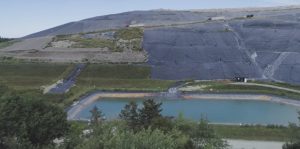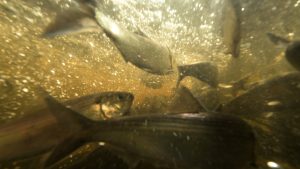
On the evening of February 15th, 2024, the Bureau of General Services held a public hearing on whether to approve the proposed 6 year contract extension for Casella Waste Systems’ management of the Juniper Ridge Landfill (JRL) in Old Town.
Juniper Ridge Landfill is state-owned, and the largest landfill in Maine. The state has contracted for its management to Casella Waste Systems, a Vermont-based company that reported over $1.26 billion in revenue in 2023. The Bureau of General Services is responsible for reviewing and approving their contract and any changes to it. Casella has applied for a 6 year extension to their Operating Services Agreement for managing the landfill, which would extend the expiration of the contract from 2034 to 2040. Over the last 20 years, Casella has drawn extensive criticism from local residents and community organizations for mismanagement and exposing nearby residents and wildlife to toxic substances.
The hearing was preceded by a press conference organized by a coalition of groups concerned with the landfill’s mismanagement. The conference featured speakers representing Penobscot Nation, Don’t Waste Maine, and Slingshot. “Casella has a track record of pollution and mismanagement across the region, and Juniper Ridge is no exception,” said Dana Colihan of Slingshot.

Penobscot Nation Ambassador Maulian Bryant spoke as well, saying that “Juniper Ridge also affects so many waterways and areas of our homelands that are crucial to our culture of hunting and fishing and harvesting from the land.” Ambassador Bryant has lived most of her life on the reservation on Indian Island, positioned on the Penobscot River just a few miles downstream of the landfill, and added that “the health and wellbeing of the river has a direct and absolute effect on the health and wellbeing of our Tribal citizens.”
During the hearing, the proposed contract received criticism and opposition from local community members of Old Town and other riverside towns, and of Penobscot Nation. Representatives also delivered testimony on behalf of Don’t Waste Maine, Slingshot, Community Water Justice, Maine Youth for Climate Justice, Maine Climate Action Now, Defend Our Health and Conservation Law Foundation. None of the spoken testimonies were in support of the contract extension.

Ed Spencer of Old Town and member of Don’t Waste Maine was the first to speak. “The state has abdicated its responsibility … and has to date rubber stamped every Casella action,” he said. Quoting a 2018 Board of Environmental Protection report, he added that this has left “the impression that the facility is being managed as a private landfill for the benefit of Casella,” rather than a public one for the benefit of Maine people.
The Juniper Ridge Landfill is located upstream of the Penobscot Nation, who have borne the brunt of environmental and health impacts from the landfill. Several citizens of Penobscot Nation attended and gave testimony speaking to the effects of the landfill on Penobscot culture and survival, which is inseparable from the land and water itself. “It’s part of our cultural fabric and it defines who we are as Penobscots,” said John Banks, Penobscot Nation citizen and former Natural Resources Director for the Tribe, speaking of the well being of all the wildlife that are also living with Juniper Ridge’s health impacts.

The landfill’s mismanagement also jeopardizes the ongoing ecological restoration efforts in and along the Penobscot River, led by Penobscot Nation. “We’ve worked hard to restore so much of what was stolen from us, but it is frustrating and unfortunate that we still must live with oppressive threats to our mother Earth right under our noses, literally,” said Ambassador Bryant, referring to the landfill’s odor, which often reaches the Penobscot reservation.
Many of the speakers urged that the Bureau not consider extending Casella’s contract before the state reviews the company’s management of the landfill, and the extent of environmental and public health impacts. “The lack of studies and review shows that that very minimum thing needs to be done before any consideration of the extension of the contract should happen,” said Jill Tompkins, Penobscot Nation citizen and Director of the Maine Indian Tribal-State Commission. Director Tompkins also lives on the river, and expressed her concern toward its current and future health, “I have never attempted to fish that river, and my grandmother didn’t even want me to touch the water. So to have that situation continue and possibly be exacerbated is really unacceptable.”

Several speakers proposed eliminating the state’s contract with Casella altogether for the reasons above. Community members also criticized Casella’s use of a loophole in state law to import out-of-state construction waste as well as dumping leachate containing PFAS directly into the Penobscot River.
Jackie Elliott of Waterboro testified that “Casella’s ever increasing amounts of imported waste have used JRL’s disposal capacity, set aside by law for Maine waste,” and that Casella seeks to expand the landfill as well as extend their contract, for the purpose of maximum profits.
Nickie Sekera, a member of Sunlight Media Collective, testified to witnessing the fire that occurred on the evening of May 15th, 2023, at the landfill. Sunlight Media was among the first and only media to document the fire that night, and despite not being downwind of the fire, she noted an intense smell and that “our bodies and cars were coated with this ash as we were leaving the area.” She continued, saying that the dioxin-filled ash and smoke blew East, to the Penobscot River, tribal lands, forests and other nearby communities.

Sekera also detailed Sunlight Media’s process of attempting to contact Casella for an explanation of what caused the fire in the weeks that followed. Neither Casella nor state or municipal agencies have come forward with an explanation of what caused the fire. “No warnings were issued to the public about the health hazards of a landfill fire … It’s not a matter of if another fire will happen, but when, as the underlying problems that created the fire have yet to be addressed.”
If you would like to submit written testimony to the Bureau of General Services and share your concerns about extending the proposed contract, you can send your comments to Lane Gould ([email protected]) by 5:00 PM on Monday February 26th.
To read a full transcript of the hearing, click here.
To read the Bangor Daily News article “Casella wants to expand Old Town landfill before it runs out of space” by Valerie Royzman, click here.








